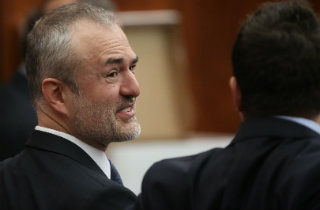“Excluded Assets Schedule” means the Excluded Assets Schedule included in the Disclosure Schedule, which may be supplemented by Buyer at any time prior to the date that is three (3) days prior to the Closing solely to designate gawker.com, together with any Seller Assets associated with gawker.com that are not otherwise used or held for use in connection with any other Acquired Assets, as an inclusion to such Schedule; provided, that any such supplement shall not result in any changes or modifications to this Agreement other than the designation of such Seller Assets as Excluded Assets.
The above text is nowhere to be found in the proposed purchase agreement between Gawker Media and Ziff Davis, who served as the “stalking horse bidder” to set the minimum bid and got a $3 million breakup fee for their trouble. In fact, in the same filing as the Unimoda agreement is the “backline comparison” where they went through the Ziff Davis agreement and color coded the changes: Everything that Unimoda removed is red with strikethroughs, while everything they added, including the above, in blue.
Update 4:06 pm 8/18/2016
Nick Denton released this staff memo:
“I am relieved that, with the approval today of the agreement with Univision, that we have found the best possible harbor for Gizmodo, Lifehacker, Kotaku, Jalopnik, Jezebel and Deadspin, and our talented writers and other staff. They will be joining The Onion, ClickHole and other beloved web properties in Fusion Media Group, the digital operation of Univision. Isaac Lee and the
team at Fusion are fellow spirits, as committed to real journalism and an open future as they are to digital media expansion.
Sadly, neither I nor Gawker.com, the buccaneering flagship of the group I built with my colleagues, are coming along for this next stage. Desirable though the other properties are, we have not been able to find a single media company or investor willing also to take on Gawker.com. The campaign being mounted against its editorial ethos and former writers has made it too risky. I can understand the caution.
Even if the appeals court overturns this spring’s Florida jury verdict, Peter Thiel has already achieved many of his objectives.
I will move on to other projects, working to make the web a forum for the open exchange of ideas and information, but out of the news and gossip business.
Gawker.com may, like Spy Magazine in its day, have a second act. For the moment, however, it will be mothballed, until the smoke clears and a new owner can be found. The archives will remain, but Monday’s posts will be the last of this iteration.
I am proud of what we have achieved at Gawker Media Group, both in our work and our business, never more so than in these last few months.
Our bloggers — and the alumni now dispersed through the media from the New Yorker to the New York Times — have introduced a new style of journalism, sometimes enthusiastic, sometimes snarky, but always authentic. We connect with a skeptical and media-savvy generation by giving them the real story, the version that journalists used to keep to themselves.
Without outside capital, we bootstrapped a profitable digital media operation. With only the talent and energy of our writers and other staff, we have drawn one of the most influential audiences in digital media: our stories connect with 100m people a month around the world. In 2016’s dance of media consolidation, the company has found a partner that understands our appeal and character;
not all will have that luck.
As for Gawker.com, founded in 2003 and mothballed in 2016, it will live on in legend. As the short-lived killer android is told in Blade Runner: “The light that burns twice as bright burns half as long, and you have burned so very very brightly.”
